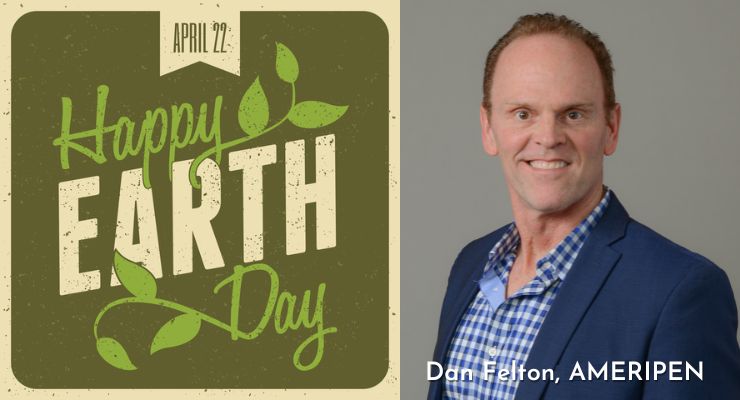Dan Felton, Executive Director of AMERIPEN04.21.23
Here’s something upon which, hopefully, we can all agree:
No packaging of any kind anywhere on Earth belongs in landfills, roadsides or waterways. It must be recovered, recycled, and reused.
Here’s something else upon which, hopefully, we can all agree:
Unless someone is living a natural lifestyle or off-the-grid, virtually everyone on Earth relies, to some extent, on packaging to hold and deliver products we use in our daily lives. For consumers at home and on-the-go and in our businesses and at work, the need for packaging is only going to continue to grow. It is critical to help ensure the quality of goods as they are manufactured, shipped, stored and consumed, thereby protecting the health and safety of people who use and handle those products.
In honor of Earth Day 2023, AMERIPEN envisions an exciting future where consumers and businesses will have even greater access to packaging recovery and recycling opportunities in their communities. To help build upon these opportunities, infrastructure, new technologies and markets for emerging packaging technologies—such as compostable and bio-based packaging options—will widen our sustainability efforts and protect our planet at the same time.
How? By embracing a collaborative approach involving AMERIPEN and other packaging value chain stakeholders, NGOs, and communities to secure public policy for packaging and the environment that is results-based, effective and efficient, equitable and fair, and upholds the value of packaging. AMERIPEN has a demonstrated track record of collaborating with all stakeholders—including legislators, administrators, environmental organizations and others in the packaging industry—to implement workable and effective solutions.
AMERIPEN is collaborating on implementation of the four packaging producer responsibility laws now in place in the U.S. (California, Colorado, Maine, Oregon), and we will continue to do the same on related proposed legislation in other states. We are also collaborating in multiple states to support end market development for recyclable materials. We are doing this through our State Recycling Market Development Taskforce made up of state and regional recycling market development program specialists.
The next product of this taskforce will be a first-of-its-kind study on the economic impact of recycling market development programs throughout the U.S. Watch for release of this new study soon.
Our Earth and its future generations rely on us working together to find solutions to expand and modernize the packaging recovery, reuse, and recycling infrastructure so we can continually improve the way we all protect the environment. This is the fresh approach that is needed and that AMERIPEN is pursuing. Anything less than that just doesn’t make sense.
According to Felton, the bills represent a critical step to building the U.S. infrastructure for increased access to recycling in all communities and to help achieve assertive recyclability, re-use, and recycled content goals. Read the full statement.
No packaging of any kind anywhere on Earth belongs in landfills, roadsides or waterways. It must be recovered, recycled, and reused.
Here’s something else upon which, hopefully, we can all agree:
Unless someone is living a natural lifestyle or off-the-grid, virtually everyone on Earth relies, to some extent, on packaging to hold and deliver products we use in our daily lives. For consumers at home and on-the-go and in our businesses and at work, the need for packaging is only going to continue to grow. It is critical to help ensure the quality of goods as they are manufactured, shipped, stored and consumed, thereby protecting the health and safety of people who use and handle those products.
In honor of Earth Day 2023, AMERIPEN envisions an exciting future where consumers and businesses will have even greater access to packaging recovery and recycling opportunities in their communities. To help build upon these opportunities, infrastructure, new technologies and markets for emerging packaging technologies—such as compostable and bio-based packaging options—will widen our sustainability efforts and protect our planet at the same time.
How? By embracing a collaborative approach involving AMERIPEN and other packaging value chain stakeholders, NGOs, and communities to secure public policy for packaging and the environment that is results-based, effective and efficient, equitable and fair, and upholds the value of packaging. AMERIPEN has a demonstrated track record of collaborating with all stakeholders—including legislators, administrators, environmental organizations and others in the packaging industry—to implement workable and effective solutions.
AMERIPEN is collaborating on implementation of the four packaging producer responsibility laws now in place in the U.S. (California, Colorado, Maine, Oregon), and we will continue to do the same on related proposed legislation in other states. We are also collaborating in multiple states to support end market development for recyclable materials. We are doing this through our State Recycling Market Development Taskforce made up of state and regional recycling market development program specialists.
The next product of this taskforce will be a first-of-its-kind study on the economic impact of recycling market development programs throughout the U.S. Watch for release of this new study soon.
Our Earth and its future generations rely on us working together to find solutions to expand and modernize the packaging recovery, reuse, and recycling infrastructure so we can continually improve the way we all protect the environment. This is the fresh approach that is needed and that AMERIPEN is pursuing. Anything less than that just doesn’t make sense.
More From Dan Felton
Felton recently issued a statement urging the U.S. House of Representatives to pass HR 8183 and HR 8059.According to Felton, the bills represent a critical step to building the U.S. infrastructure for increased access to recycling in all communities and to help achieve assertive recyclability, re-use, and recycled content goals. Read the full statement.




























